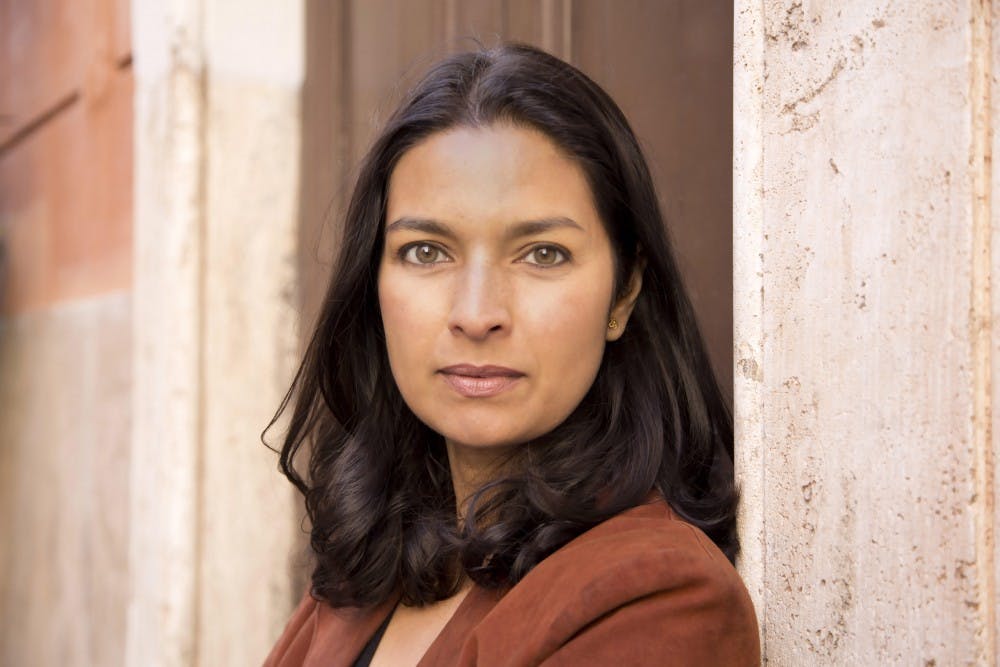The Lewis Center for the Arts recently named Professor Jhumpa Lahiri Director of the University’s Program in Creative Writing.
Lahiri was named to the position after former director and 2017 U.S. Poet Laureate Tracy K. Smith was named Chair of the Lewis Center for the Arts on July 1, after having served as the creative writing director for four years. A faculty member in the Program in Creative Writing since 2015, Lahiri also serves as associate faculty with the departments of Comparative Literature and French and Italian.
As Director of the Program in Creative Writing, which celebrates its 80th anniversary this year, Lahiri said she will bring “a new perspective, one that will reflect my own mix of interests that are now developing and moving forward, especially in my time here at Princeton. By that I mean really looking at the larger dialogue between writing and translation, maintaining a very international focus within the Creative Writing Program, [and] looking at creative writing and other disciplines in the arts and other academic disciplines across the University.”
“In her time on the faculty, [Lahiri has] innovated several new courses and worked collaboratively with students in a variety of ways,” Smith wrote in an email to The Daily Princetonian. “She also has a respect for the urgencies our students grapple with every day — from questions of climate change, to migration, to gender and sexuality and beyond. She'll embolden students to use writing as a means toward insight and clarity in those and other areas.”
Lahiri received the Pulitzer Prize in 2000 for her debut collection of stories, “Interpreter of Maladies.” Her other titles include “The Namesake,” “Unaccustomed Earth,” and “The Lowland,” which was named a finalist for the Man Booker Prize and the National Book Award in fiction in 2013.
Lahiri has received numerous awards and fellowships, including the PEN/Hemingway Award, the PEN/Malamud Award for Excellence in the Short Story, the Addison Metcalf Award from the American Academy of Arts and Letters, the Vallombrosa Von Rezzori Prize, the Asian American Literary Award, the Frank O’Connor International Short Story Award, a Guggenheim Fellowship, and a National Endowment for the Arts Fellowship. In 2014, she was awarded a National Humanities Medal by President Barack Obama.
Lahiri has also written and published works in Italian — including “In Altre Parole (In Other Words),” “The Clothing of Books” (originally published in Italian), and “Dove mi trovo” — and translated works by herself and other authors from Italian to English. Lahiri’s translation of Domenico Starnone’s “Trick” was a finalist for a National Book Award, and her translation of Starnone’s “Ties” was named a New York Times Notable Book and Best Foreign Novel by the Times of London in 2017. Lahiri also edited and introduced “The Penguin Classics Book of Italian Short Stories.”
Lahiri was born in London and raised in Rhode Island. She earned a B.A. in English literature from Barnard College in addition to an M.A. in English, M.F.A. in Creative Writing, M.A. in Comparative Literature, and Ph.D. in Renaissance Studies from Boston University. In addition to teaching at the University, Lahiri has led courses in creative writing at Boston University, Baruch College, Barnard College, The New School, and the Rhode Island School of Design.
In addition to her duties as Director of the Creative Writing Program, Lahiri is currently teaching what she describes as a “very hybrid” course about artist, painter, and novelist Leonara Carrington, from whom Lahiri draws inspiration.
“To me, [Carrington] epitomizes the potential of the Creative Writing Program,” Lahiri said. “She’s a visual artist, a writer, a writer who writes outside of her dominant language who was a figure who crossed borders geographically, linguistically, culturally … It’s that kind of breadth that really excites me about her personally, which is why I’m teaching this course, but I look to her as guidance in terms of how wide-reaching, how far-reaching creative writing can be. That’s exciting to me, just to ponder her example and think about how to keep widening the conversation.”
The goal of “widening the conversation” is one that the Creative Writing Program will focus on as it moves into its next stages. As student interest in taking workshop courses increases and the University enacts its plans to expand class sizes in the coming years, Lahiri foresees that the program will need to adapt to accommodate the demand and carefully consider whether to increase the number of courses offered or the number of seats in each workshop, which are currently capped at 10 students.
“Having taught workshops, I know the difference between 10 and 15,” Lahiri said. “It’s a big difference, actually — a huge difference.”

Smith considers Lahiri “uniquely equipped to amplify the conversation between student writing, contemporary literature and current issues.”
Smith also sees the future of the program including “more types of courses, and a broadening of opportunities for students to pursue certificates in CWR.”
Lahiri also intends to continue important conversations about how to make sure the program’s courses and climate are truly inclusive and supportive to all students.
“There are many ways in which creative writing can be defined here within Princeton and within the Princeton community,” Lahiri said. “That will certainly be one of my objectives, to be very vigilant toward that and to keep opening our doors and inviting students from all departments across the campus.”








